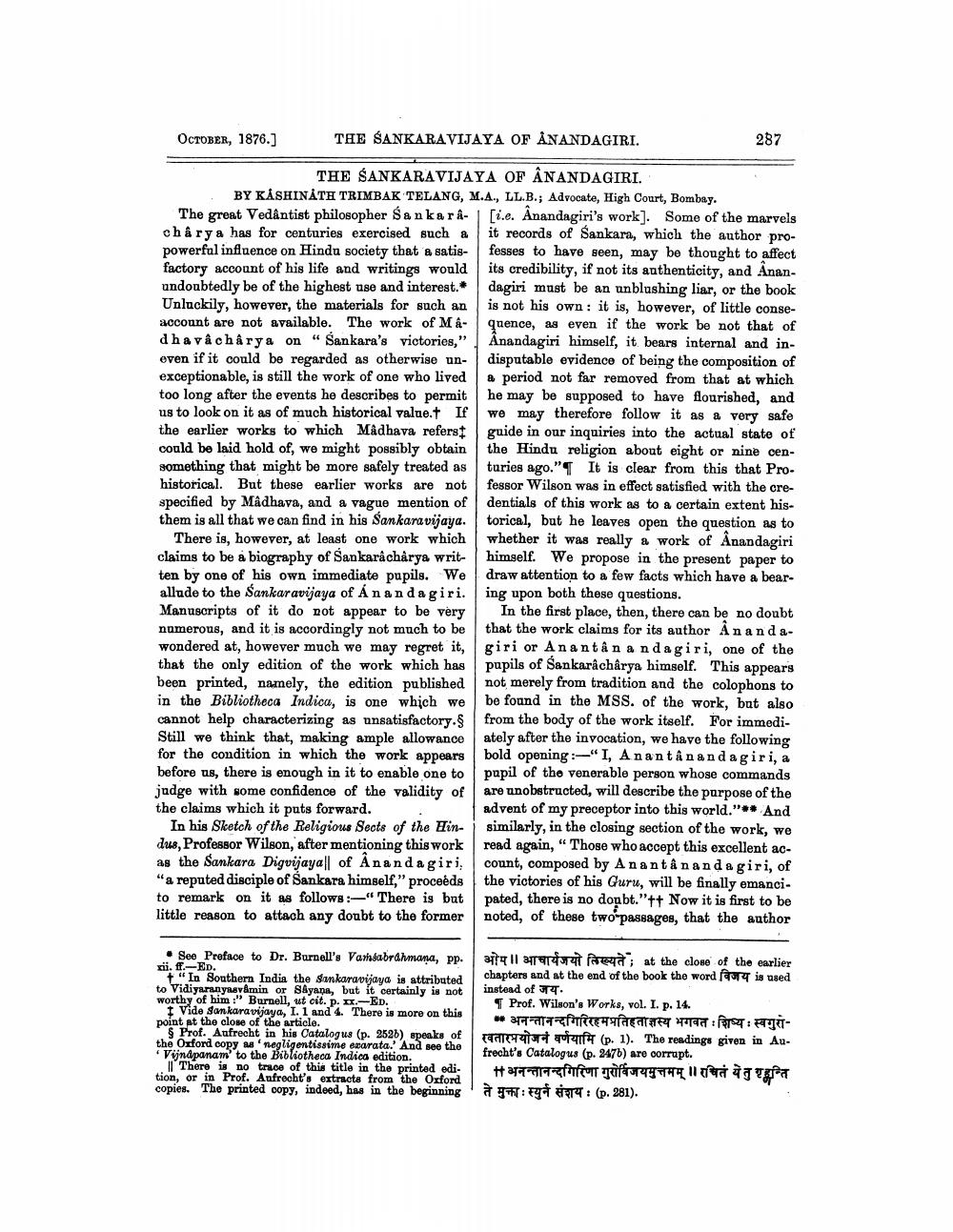________________
OCTOBER, 1876.]
THE SANKARAVIJAYA OF ÅNANDAGIRI.
287
THE SANKARAVIJAYA OF ANANDAGIRI. BY KASHINATH TRIMBAK TELANG, M.A., LL.B., Advocate, High Court, Bombay. The great Vedantist philosopher Sankara- [i.e. Anandagiri's work]. Some of the marvels charya has for centuries exercised such a it records of Sankara, which the author propowerful influence on Hindu society that a satis- fesses to have seen, may be thought to affect factory account of his life and writings would its credibility, if not its anthenticity, and Ananundoubtedly be of the highest use and interest.* dagiri must be an unblushing liar, or the book Unluckily, however, the materials for such an is not his own: it is, however, of little conseaccount are not available. The work of M&- quence, as even if the work be not that of dhavâ charya on “ Sankara's victories," Anandagiri himself, it bears internal and ineven if it could be regarded as otherwise un disputable evidence of being the composition of exceptionable, is still the work of one who lived a period not far removed from that at which too long after the events he describes to permit he may be supposed to have flourished, and us to look on it as of much historical value. If we may therefore follow it as a very safe the earlier works to which Madhava referst guide in our inquiries into the actual state of could be laid hold of, we might possibly obtain the Hindu religion about eight or nine censomething that might be more safely treated as turies ago." It is clear from this that Prohistorical. But these earlier works are not fessor Wilson was in effect satisfied with the crespecified by Madhava, and a vague mention of dentials of this work as to a certain extent histhem is all that we can find in his Sankara vijaya. torical, but he leaves open the question as to There is, however, at least one work which whether it was really & work of Ânandagiri
be a biography of Sankarachårya writ- himself. We propose in the present paper to ten by one of his own immediate pupils. We draw attention to a few facts which have a bearallude to the Sankaravijaya of Anandagiri. ing upon both these questions. Manuscripts of it do not appear to be very In the first place, then, there can be no doubt numerous, and it is accordingly not much to be that the work claims for its author Anandawondered at, however much we may regret it, giri or Anantâna ndagiri, one of the that the only edition of the work which has pupils of Sankaracharya himself. This appears been printed, namely, the edition published not merely from tradition and the colophons to in the Bibliotheca Indica, is one which we be found in the MSS. of the work, but also cannot help characterizing as unsatisfactory.s from the body of the work itself. For immediStill we think that, making ample allowance ately after the invocation, we have the following for the condition in which the work appears bold opening :-"I, Anantânandagiri, a before us, there is enough in it to enable one to pupil of the venerable person whose commands judge with some confidence of the validity of are unobstructed, will describe the purpose of the the claims which it puts forward.
advent of my preceptor into this world."** And In his Sketch of the Religious Sects of the Hin- similarly, in the closing section of the work, we dus, Professor Wilson, after mentioning this work read again, " Those who accept this excellent acas the Sankara Digvijayall of Anandagiri, count, composed by Anantâ nanda giri, of "a reputed disciple of Sankara himself," proceeds the victories of his Guru, will be finally emancito remark on it as follows:-"There is but pated, there is no dogbt."'++ Now it is first to be little reason to attach any doubt to the former noted, of these two passages, that the author
• Seo Proface to Dr. Burnell's Varadabrdhmana, pp. xij.ff.-ED.
"In Southern India the Sankaravijaya is attributed to Vidiyarın ynsv&min or S&yana, but it certainly is not worthy of him." Burnell, ut cit. p. IX.-ED.
t Vide Sankara vijaya, I. 1 and 4. There is more on this point at the close of the article.
Prof. Aufrecht in his Catalogus (p. 2526) speaks of the Oxford oopy ' negligentissime aparata. And see the Vindpanam to the Bibliotheca Indica edition.
There is no trace of this title in the printed edi. tion, or in Prof. Aufrecht's extracts from the Oxford copies. The printed copy, indeed, has in the beginning
all
a r t pe at the close of the earlier chapters and at the end of the book the word for is used instead of UTT.
I Prof. Wilson's Works, vol. I. p. 14. - अनन्तानन्दगिरिरहमप्रतिहताज्ञस्य भगवत शिष्यः स्वगुरो
r oft (p. 1). The readings given in Au. frecht's Catalogus (p. 9476) are corrupt.
अनन्तानन्दगिरिणा गुरोविजयमुत्तमम् ॥रचितं ये तु रडन्ति
: : (p. 281).
C




